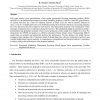Free Online Productivity Tools
i2Speak
i2Symbol
i2OCR
iTex2Img
iWeb2Print
iWeb2Shot
i2Type
iPdf2Split
iPdf2Merge
i2Bopomofo
i2Arabic
i2Style
i2Image
i2PDF
iLatex2Rtf
Sci2ools
COR
2010
2010
The distributed permutation flowshop scheduling problem
This paper studies a new generalization of the regular permutation flowshop scheduling problem (PFSP) referred to as the distributed permutation flowshop scheduling problem or DPFSP. Under this generalization, we assume that there are a total of identical factories or shops, each one with machines disposed in series. A set of n available jobs have to be distributed among the factories and then a processing sequence has to be derived for the jobs assigned to each factory. The optimization criterion is the minimization of the maximum completion time or makespan among the factories. This production setting is necessary in today's decentralized and globalized economy where several production centers might be available for a firm. We characterize the DPFSP and propose six different alternative Mixed Integer Linear Programming (MILP) models that are carefully and statistically analyzed for performance. We also propose two simple factory assignment rules together with 14 heuristics base...
Related Content
| Added | 09 Dec 2010 |
| Updated | 09 Dec 2010 |
| Type | Journal |
| Year | 2010 |
| Where | COR |
| Authors | B. Naderi, Rubén Ruiz |
Comments (0)

